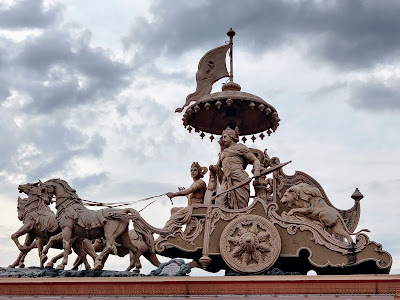Ved Vyas who wrote the complete Mahabharat also wrote about the Shanti Parva and he furtherer asserted that Shanti Parva is no less important than the Mahabharata because Shanti Parva in itself consists of 365 chapter which talks about raj dharma in a descriptive manner.
Shanti Parva is nothing but the record of the conversation between Bisham and Yudhishthira after the war had ended.
Shanti Parva is nothing but the record of the conversation between Bisham and Yudhishthira after the war had ended.
When the war ended the dharma raj Yudhishthira went to Beecham and asked Bhisma, to enlighten him with rules to run the state.
Then Bhishma, who was having all the great knowledge of dharma and statecraft guide him further that how he should run the state in a ‘dynamic way.
In Rajdharma, Bishma initially explains Yudhishthira, the origin of state; Bisham explains to Yudhishthira that in the pre-war period, people were living with DHARMA, in a harmonious environment, but with the span of time there was a decline in the moral character of the people.
The great Bisham also explains Yudhishthira regarding the importance of "DAND" and "DANDNITI". Chapter 59 of Shanti Parva illustrates the importance of Dand and Dandniti as per Bisham, Dandniti is important to destroy evil or important in order to remove the darkness.
As per Bisham, when everyone is sleeping the Dand and Daniti is awakened and it’s the fear of Dand among the people which regulates the behavior of all sections of society.
In Rajdharma, Bishma initially explains Yudhishthira, the origin of state; Bisham explains to Yudhishthira that in the pre-war period, people were living with DHARMA, in a harmonious environment, but with the span of time there was a decline in the moral character of the people.
‘DHARMA’ has been replaced by ‘ADHARMA’, the anarchy expands all over the society, a sense of insecurity arises among each section of society.
All of this happened due to the fact that humans became greedy and jealous, and to cope with this situation people go to Brahma Ji and prayed to him to help them overcome this situation and to accept the proposal to be their king.
As people were so desperate and unable to organize themselves Brahma Ji gave this task to MANU and asked him to rule the masses and create an order in the world.
Even the people, also requested manu to be their king and promise them that they will co-operate with him in order to maintain the systematic order of the society and to ensure justice.
They also promised that they will pay tribute (tax) to the king, manu agreed to become their king to re-establish dharma.
Bishma further explain Yudhishthira regarding the quality and duty of a king;-
Bishma further explain Yudhishthira regarding the quality and duty of a king;-
Quality of a King
In chapter 70 of Shanti Parva, Bisham explained Yudhishthira ceratin unavailable virtues which a capable and ideal king should have.
Bisham explained that a king should follow his duty without having any emotion, a king should be liberal, pure, and have a strong character.
As per chapter 56th and verse 19th and 20th of Shanti Parva, Bisham asserts that a king should have all accomplishments and good conduct, self –controlled, and must keep his passion and aggression under control.
Duties of a King
Duties of a King
"DHARMA" and "PRAJAHIT" are the two key duties of a king.
Here DHARMA stands for cosmic order that is RITI, and PRAJAHIT means helping those people who were unable to help themselves, there were many ways of doing PRAJAHIT such as building roads, providing jobs, ensuring the security of people by eliminating both internal and external threats.
As per Bisham, it is the duty of the king to give up all his likes and dislikes. The king should act fearless and should perform all his acts as per the DHARMA and should always behave in an impartial manner.
It is also the duty of the king to ensure the prosperity of the state. The king should respect the advice of pursuit and the king must deliver the "JUSTICE" as according to the "DHARMA".
It is also the duty of the king to ensure the prosperity of the state. The king should respect the advice of pursuit and the king must deliver the "JUSTICE" as according to the "DHARMA".
Dand and Dandniti
The great Bisham also explains Yudhishthira regarding the importance of "DAND" and "DANDNITI". Chapter 59 of Shanti Parva illustrates the importance of Dand and Dandniti as per Bisham, Dandniti is important to destroy evil or important in order to remove the darkness.
As per Bisham, when everyone is sleeping the Dand and Daniti is awakened and it’s the fear of Dand among the people which regulates the behavior of all sections of society.
It’s the Dandniti and Dand which help the ruler to maintain order in the state as given by the Veda and those who deny doing the task assigned to them as per Veda should be punished according to the Dandniti.
Written By - Shivam Jha
Edited By - Akash Verma











0 Comments